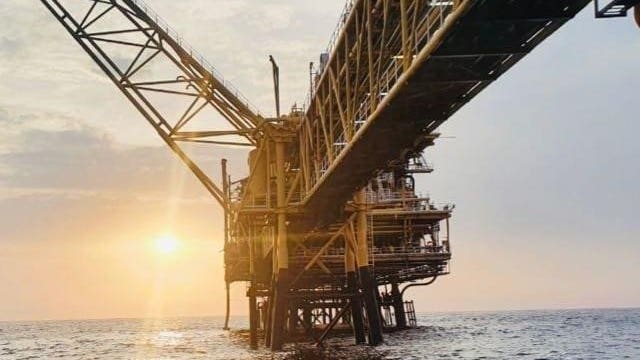On paper, London-listed energy minnow Afentra (LON: AET) has a simple plan – chase mature hydrocarbon assets the international oil companies (IOCs) are ditching and tap hitherto untapped adjoining fields for additional resource maximization.
But what’s simple on paper, requires expertise in the art of negotiation, prudent planning and determination in practice. Perhaps its fitting that the upstart is fronted by none other than Paul McDade as it seeks returns in West Africa via this well practiced drill.
An ex-Tullow Oil (LON: TLW) executive with decades of experience in North Sea oil and gas exploration and maturing assets, McDade, CEO of Afentra, tells Forbes he brings learnings from his past life into his current business in a search for petrodollars that shareholders and wider community stakeholders demand.
“My prior experience, of buying mature fields and revitalizing them for resource maximization, connects to my current journey with Afentra. West Africa is currently where the North Sea was in 2003. Back then, the fiscal operating climate allowed independent energy companies to competitively enter the fray as IOCs retreated.
“And it’s only now do we see the tail end of the North Sea having reached the point of diminishing returns and excessive taxation. West Africa’s journey is just beginning, and we see opportunities there, especially in Angola.”
Afentra’s key plays comprise of non-operated interests in Angola’s long-life, shallow water offshore production blocks 3/05 and the adjacent 3/05A offering additional development potential.
“After reviewing nearly 40 deals in Africa, we sat down with the Angolan government as partners to discuss investments in fields that were reaching maturity in line with our strategy. The operating license of the acreage of interest to us was subsequently extended to 2040, in exchange for promises on continued investment and increasing production.”
All about the numbers
The market is a fickle beast and the company that Afentra keeps via its listing on the London Stock Exchange’s junior Alternative Investment Market (AIM) doesn’t have the best of track records. London’s junior exchange is littered with firms that overpromise and underdeliver, but McDade insists Afentra is different because its not a speculative explorer but one with producing assets.
Headline production of block 3/05 came in at 21,000 barrels per day (bpd) in August up from 17,000 bpd earlier in the year, and Afentra is increasing ownership and improving equity alignment across both blocks 3/05 & 3/05A. Under a revised deal, the company will give up 6% of block 3/05 to Sonangol – Angola’s national oil company – by acquiring 14% as opposed to 20% and gain a further 12% in block 3/05 and 16% in nearby 3/05A through a separate transaction with Azule Energy.
More importantly, the block 3/05 barrels, swapped in as part of the deal, will carry a higher value backed up by better economic terms. On deal completion, Afentra will hold 30% (vs. 24%) of block 3/05 and a much larger 21.3% stake (vs. 5.33%) in block 3/05A.
“To bring this about, in the past year we have taken a balance of $35-37 million. By the end of the financial year once outstanding deals have been completed, we will probably have a net debt of $40-50 million. But we’re also a company will likely be generating $50 million in revenue per year for the foreseeable future.
“The deals we are doing have been quite complicated and there have been some delays. Skeptics says they may never close, and we’ll prove them wrong by the end of this year. Many AIM companies may perhaps carry a high risk / reward dynamic but we aren’t in that bracket. We have proven reserves and cash flow.
“We have an executive team that’s of a FTSE 100 caliber sitting within an AIM company. We will bring all this experience to bear and be opportunistic in our journey. In five years’ time we want to build a multijurisdictional company with a viable production base of tens of thousands of barrels and a mixture of both operated or non-operated exploration plays.”
Sticking with Angola
McDade says any takings for Afentra are also a vital source of income for Angola – the proceeds of what he describes as a just energy transition.
“In 2020, a year before Afentra was listed, I noticed how the European discourse about energy transition had an overt focus on climate, infused with debates about energy security. While these are legitimate concerns, a contrasting view from Africa is not just of a concern over the climate, but one intertwined with the social context of energy poverty.
“Many in Africa find the posturing and pressure, as well as demands to ditch oil and gas exploration from Europe to be unfair. That too for a problem of carbon emissions largely created by the West. Our aim is a simple one – deliver value for shareholders, and the broader stakeholder community by getting into mature oilfields, increasing production and reserves, and reducing emissions.
“There are 15 billion barrels of oil equivalent discovered in Angola yet to be produced. When we look at 3/05 there is so much potential, only 43% of the reserve has been tapped. It’s a big area with large shallow water drilling potential that’s less capital intensive then deep water exploration. In line with this thinking we will keep looking for deals with much of our focus on Angola.”
Read the full article here













Leave a Reply